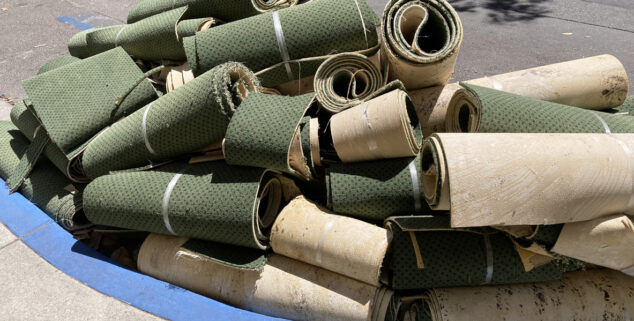Opinion
If carpet recycling is working, why change it?
 Pile of cut up and rolled old carpets are ready hauling services. Image by Michael Vi
Pile of cut up and rolled old carpets are ready hauling services. Image by Michael ViOPINION – At times, the legislative process appears convoluted and counterintuitive. In the middle of a major budget shortfall and reductions in funding and operations throughout government, modest legislation, AB 863, initially intended to modify the state’s carpet recycling program was heavily amended to create a costly, alternative program, impacting manufacturers and California consumers.
In the amended version, AB 863 dissolves the existing California Carpet Stewardship Program, established in 2010 and administered through the Carpet America Recovery Effort (CARE), a program that has seen significant progress and continues to increase and advance carpet recycling and sustainability efforts in California annually.
The current consumer-funded program, that has successfully created a network of manufacturing, retail, and recycling operators, would be replaced with a new, unproven program model. AB 863 would establish an industry-funded producer responsibility organization (PRO) overseeing the collection, transportation, and recycling of multiple flooring products.
For 18 months, the language in AB 863 was limited to addressing operational issues in the CARE program. However, it was unexpectedly revised this week to significantly broaden the existing carpet recycling initiative, encompassing all types of flooring products – including carpet, carpet tile, convention carpet, carpet cushion, resilient (linoleum, luxury vinyl tile, sheet vinyl, vinyl composite flooring, cork, and rubber), and artificial turf. This significant program expansion has not been properly vetted. Impacted stakeholders – manufacturers, retail stores, and recyclers – that are in almost every city in California have not been consulted about the amendments and given the opportunity to raise questions and have them addressed and adequately answered.
AB 863 will significantly increase the cost of all flooring, on top of consumers’ concerns with inflation. AB 863 makes flooring manufacturers responsible for paying the initial costs of the recycling program, but those costs will ripple through the system eventually reaching California consumers, costing many hundreds of millions of dollars over 10 years.
It’s crucial to highlight rising costs will impact government entities including state agencies, schools, and local governments, leading to budgetary increases. Ironically, the California Building Industry Association warns that AB 863 will raise the cost of construction for government supported low-income and affordable housing as the state considers major reductions to state housing programs.
AB 863 lacks sufficient justification considering the significant progress achieved by the CARE Program, which it seeks to dissolve. CARE has been operational for a dozen years and increased its recycling rate from 4% in 2012 to 41% in 2024.The program expanded collection to every county in the state with over 350 collection sites across California by the end of 2023, diverting 50% of carpet from landfills in the most recent year. Since 2011, the program collected over 1.2 billion pounds of post-consumer carpet.
The current problems with collection and recycling in the plastics program are a preview of what we can expect if AB 863 becomes law. Well-meaning attempts to force all the state’s urban, suburban, and rural areas into a one-size-fits-all approach for recycling will not work. The public, the flooring industry, and the network of recycling businesses need to be part of the discussion. AB 863 will upend the progress made and should be rejected by the Senate. A larger program is not always the better policy.
Lance Hastings is the President and CEO of the California Manufacturers & Technology Association.
Want to see more stories like this? Sign up for The Roundup, the free daily newsletter about California politics from the editors of Capitol Weekly. Stay up to date on the news you need to know.
Sign up below, then look for a confirmation email in your inbox.

Leave a Reply